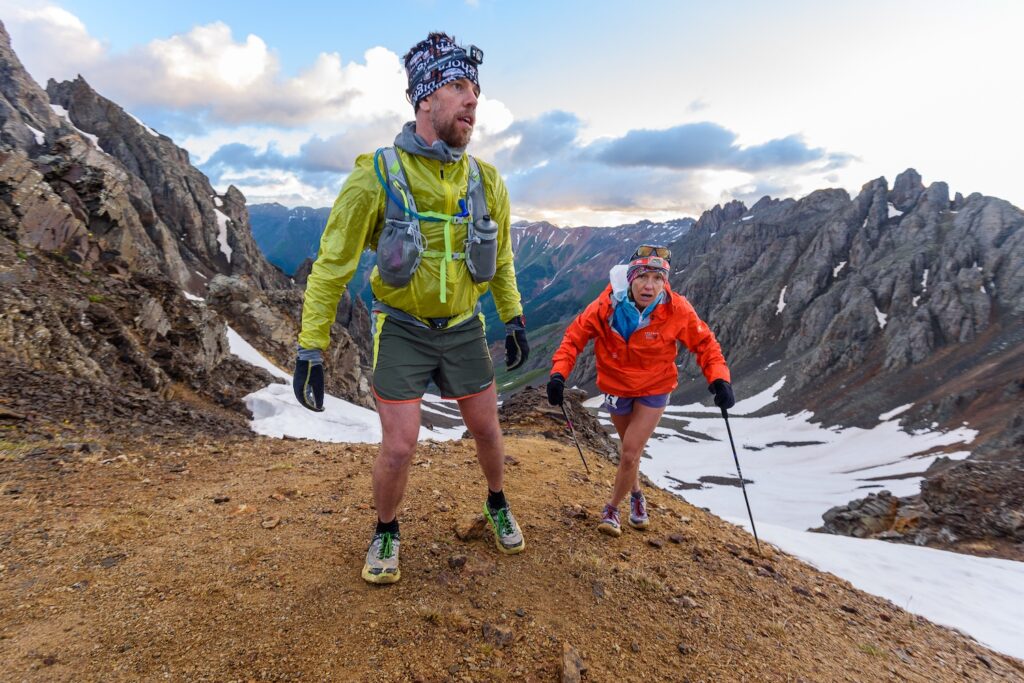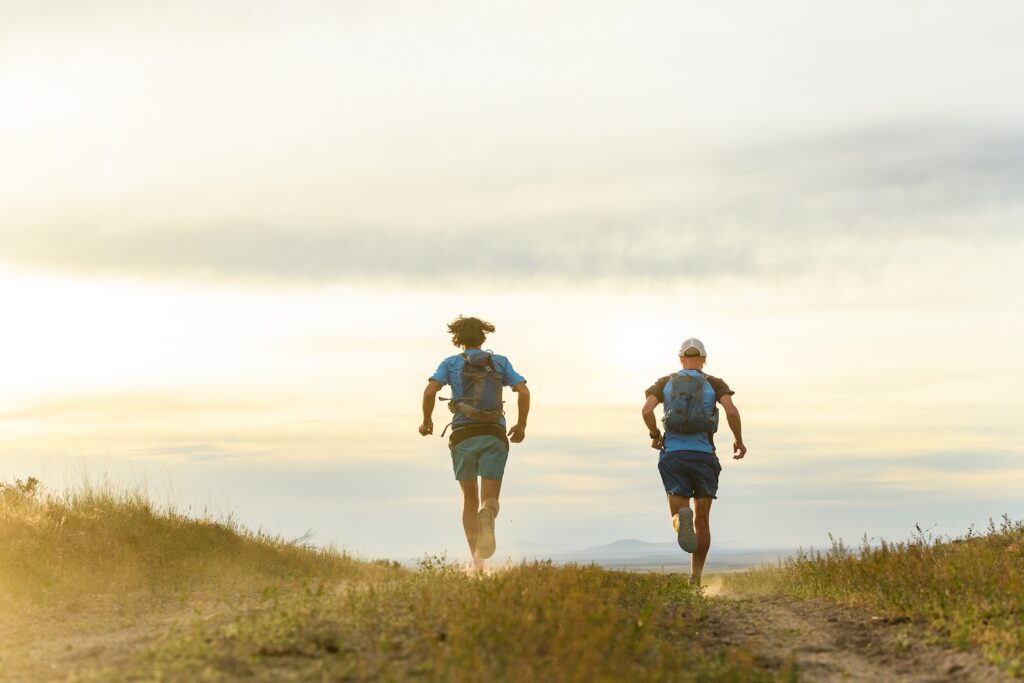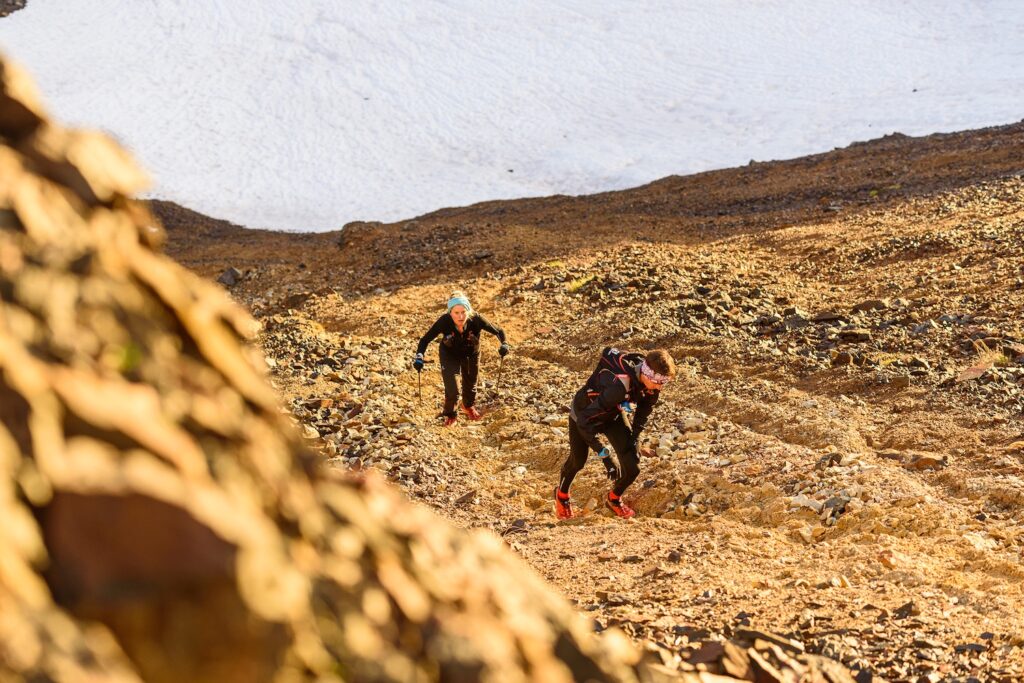Altitude camps have been the classic way to improve oxygen transport in endurance athletes for decades. But over the last few years, a different environmental tool has moved from niche to mainstream: long-term heat training.
The key question for mountain and ultra athletes is no longer “does heat training work?” but: How does heat training compare to altitude, and when should you use one, the other, or both?
In this second article in the series, we will connect the dots between heat and altitude, and look at what the latest research says about performance gains, hematological changes, and practical trade-offs for real-world athletes.
Altitude: powerful but tricky
The Nybo “High or hot” perspective study lays out how altitude and hypoxia affect the body very clearly. To reliably increase hemoglobin mass (Hbmass) via altitude, you generally need:
- At least 3 weeks of exposure
- Living and mostly training above ~2,500 m/8,200ft should be sufficient hypoxic dose for most athletes seeking performance gains for low or moderate altitude (<3000m).
- Many hours per day in hypoxia (true “live high, train high” or “live high, train low” or a combination)
Under these conditions, typical Hbmass gains are about 3–5% after 3–4 weeks. The problem is decay – what happens when you come back down in altitude:
- Roughly half of the Hbmass gains disappear in the first 7 days back at sea level.
- Most studies suggest you’re close to baseline again within ~14 days.
Altitude also brings:
- Large inter-individual variability in response. Some athletes gain a lot, some very little, which is why it’s important to make your own observations and test how your body responds to an altitude camp).
- Practical constraints: travel, cost, logistics, and the impact of altitude itself on training intensity and recovery.
Altitude is therefore a powerful tool but timing and periodization is tricky and requires a good understanding of the athlete and the timeline of adaptations. It’s best when you can:
- Schedule a camp close enough to your key event to benefit from the Hbmass peak, and
- Protect training quality and recovery during the camp.

Classic heat acclimation: fast and robust in the heat
The McDonald review on exercise heat acclimation shows that even short-to-medium protocols (around 8 sessions, 90 minutes, ~39 °C/102 °F) produce robust physiological benefits:
- Plasma volume ↑ ~5.6%
- End-exercise HR ↓ ~17 beats/min
- End-exercise core temperature ↓ ~0.43 °C
- Whole-body sweat rate ↑ ~163 mL/h
- Time to exhaustion in the heat ↑ ~49%
- Self-paced time-trial performance in the heat ↑ ~3.1%
Most of these adaptations develop within 7–10 days, and are largely complete by 10–14 days. These “classic” HA protocols are excellent if you have a key race in the heat, and have 1–2 weeks to prepare close to the event.
However, they don’t necessarily guarantee big gains in cool conditions, and they can compromise training quality if the heat stress is poorly planned around intensity and volume in the overall training plan. This is where longer, integrated heat blocks can serve as an alternative to altitude without impacting training quality. This should not be considered a pre-race survival tool! So plan carefully based on the specifics of your objective and your time available for training. tools and more like a true alternative to altitude.
Long-term heat training: a sea-level alternative to altitude?
More recent work has shifted from short HA blocks to longer heat training interventions embedded inside an athlete’s training plan.
Elite cyclists: 5 weeks of exercise heat training
In a large study of elite female and male cyclists, Lundby et al. assigned athletes to five weeks of heat training (HEAT) or a control condition (same training, normal temperature). The HEAT group completed five 50-minute heat sessions per week, wearing insulating clothing in a thermoneutral chamber to elevate core temperature, while continuing their normal cycling program.
Compared to controls, the HEAT group showed:
- Hemoglobin mass ↑ ~4.0% in women and ~3.5% in men
- No change in skeletal muscle metabolism, muscle fiber distribution or capillary density (suggesting the primary adaptation was hematological, not muscular).
- Significant improvements in:
- Lactate threshold
- VO₂max
- 15-minute all-out cycling performance in a normal-temperature lab.
So in this setting, five weeks of heat training produced Hbmass gains similar to many altitude camps and improved performance in a thermoneutral environment, not just in the heat. These gains occurred at sea level, without disrupting athletes’ normal training structure.
Well-trained runners: 5 weeks of passive heat (hot-water immersion)
Jenkins et al. set out to test whether similar benefits could be achieved without changing training all. They had 10 well-trained endurance runners complete five weeks of hot-water immersion (HWI):
- 5 sessions per week
- 45 minutes per session
- Water temperature ≥ 40 °C/104 °F, completed after their regular training
After hot water immersion vs. no heat training, they found:
- Hemoglobin mass ↑ 33 g
- Blood volume ↑ ~284 mL
- Stroke volume ↑ ~10 mL
- VO₂max ↑ 2.7 mL·kg⁻¹·min⁻¹
- Treadmill speed at VO₂max ↑ 0.8 km/h
Statistical analyses showed Hbmass was the strongest predictor of VO₂max improvements, but the cardiac changes also contributed. In other words, passive heat alone – with no change to normal training – produced coordinated hematological and central cardiovascular adaptations that improved aerobic capacity.
This extended protocol offered fresh insights into the enhanced benefits of prolonged heat exposure compared to shorter interventions. The documented improvements in oxygen-carrying capacity and VO2max translate directly to better endurance performance.
That said, practical implementation requires careful consideration of your training capacity and recovery demands. For athletes limited to 5-6 hours of weekly training, adding heat sessions on a basement treadmill may compromise rather than complement their training program. Heat training works best when layered onto an already solid aerobic foundation, not as a substitute for foundational fitness development.
Heat Maintenance and Sex-Specific Data
While most early heat-training work has been done in male athletes, recent data fill some gaps. Richard et al. studied trained female cyclists, who did 10 days of home-based heat acclimation (overdressed cycling), followed by three weeks of heat maintenance (nine additional overdressed sessions).
Compared with a thermoneutral (no heat training) control group, the heat group showed:
- Increased peak power output from pre → mid → post.
- Faster 20-km time-trial performance in 35 °C/95 °F after HA, with further improvement after the three-week maintenance block.
- Higher sweat rate at the end of the study.
- No change in VO₂max or Hbmass.
This tells us a few important things:
- Female athletes respond meaningfully to medium–long HA plus maintenance, both in hot time trial performance and sweat responses.
- Performance can still improve even when VO₂max and Hbmass stay the same.
- Meaningful hematological changes in female athletes likely require longer and/or more intense blocks than 10–13 sessions.
The extended five-week Lundby protocol, involving five heat sessions per week, produced a meaningful ~4% increase in hemoglobin mass among elite female cyclists, evidence that volume matters. A few scattered heat exposures may improve thermal comfort for racing in hot conditions, but they won’t trigger the physiological adaptations needed to increase blood volume. This distinction is important: if you are simply preparing for a hot-weather race, a handful of heat training sessions may suffice. But if your objective includes elevating VO2max and achieving performance gains in the heat, commit to a longer heat training block with consistent exposure over several weeks, not just sporadic sessions.
Heat vs Altitude: Overlapping But Not Identical
Nybo’s “High or hot” paper integrates these findings into a simple comparison:
Altitude (“high”):
- Strong erythropoietic stimulus: 3–5% Hbmass gain after 3–4 weeks at >2,500 m.
- Gains decay quickly when you return to sea level (often gone within two weeks).
- Non-hematological adaptations include improved ventilatory response and somewhat reduced desaturation at altitude.
Heat (“hot”)
- Short/medium HA (7–14 days)
→ large plasma volume expansion
→ lower HR and core temperature
→ better sweating
→ clear performance gains in the heat
Benefits in cool conditions with these short protocols are limited and inconsistent.
- Long-term heat training (~5 weeks, ≥5 sessions/week, core ~38.5–39 °C/101.3-102.2 °F):
→ ~3% Hbmass increase in elite athletes
→ Improved performance in both hot and normal conditions
→ Easier to maintain with 2–3 weekly heat sessions after the main block, compared to altitude where Hbmass decays quickly.
When we compare altitude and heat training, both altitude and long-term heat training can give you similar size Hbmass gains (~3–4%). Altitude requires you to live high and accept reduced training intensity. Heat lets you stay at sea level, integrate sessions into normal training, or even use passive strategies (HWI, sauna) to avoid compromising key workouts and recovery .
Can You Be Heat- and Altitude-Adapted at the Same Time?
Conceptually, yes – and Nybo argues that non-hematological adaptations from heat and altitude are largely complementary:
Heat = better sweating, more plasma volume, lower HR and core temperature in the heat.
Altitude = better ventilatory response, less desaturation, improved tolerance of chronic hypoxia.
The catch might lie in the blood volume dynamics:
- Altitude initially reduces plasma volume, then gradually builds Hbmass.
- Heat rapidly expands plasma volume and, over longer periods, pushes Hbmass up.
Some combined-camp studies suggest that stacking hard altitude and hard heat at the same time may blunt benefits compared with doing either alone, likely because the signals to plasma volume and total blood volume are conflicting and overall stress is very high. For most athletes, a practical approach could be:
- Make one environment (heat or altitude) the primary stressor in a given block.
- Use the other in maintenance doses, not as an equally heavy second stressor.
For instance, an athlete prioritizing an altitude training block might incorporate short post-run sauna sessions solely to preserve heat tolerance, rather than pursue additional adaptations. This approach demands vigilant monitoring of recovery markers and performance metrics. Remember that performance enhancement remains the ultimate goal, so stacking multiple physiological stressors creates a significant overreaching risk if not managed carefully.
How to Choose: Altitude, Heat, Both, or Neither?
Putting the data together we could suggest a simple decision framework:
1. What is your key race environment?
Very hot environments (desert race, hot UTMB year, tropical ultra): Heat training is non-negotiable. Short 7–14 day HA before the race, possibly on top of longer low-level exposure, is justified.
High but cool environments (e.g. fast 4–5,000 m ascents, high altitude ultramarathons): Altitude training camps or simulated hypoxic exposure are the appropriate choices here, depending on accessibility. Heat training falls short because it bypasses critical altitude-specific adaptations (ventilatory acclimatization, improved oxygen utilization, and metabolic adaptations specific to hypoxia. Use heat protocols when hypoxic exposure isn’t feasible, and accept that you will be missing some of the key physiological adaptations specific to the demands you will face.
2. Do you have access to real altitude camps?
Yes, if you can go for ≥3 weeks close to the event: altitude is still the most direct Hbmass tool. Use heat carefully, as a secondary or off-season block.
No, or you have access to short altitude trips: long-term heat blocks (exercise +/or passive) are a realistic alternative for small Hbmass and VO₂max gains.
3. What is your main limiter?
Clearly heat intolerance in races: prioritize a 10–14 day HA block and/or post-session sauna/Hot Water Immersion in the final 2–3 weeks before the race.
Strong in the heat but underpowered at altitude or in cool TTs: consider a 5-week heat block (exercise or passive), targeting Hbmass and central adaptations, or a classic altitude camp if logistics allow.
4. Overall life stress load and training quality
If you can’t afford to compromise key intensity days, passive strategies like hot-water immersion or sauna after easy or moderate sessions can be the best tool – they preserve normal training yet still drive hematological and central adaptations.
If you can protect recovery and reduce overall load, you can push harder with exercise-heat protocols similar to Lundby’s (5 × 50 min/week) and McDonald’s “classic” heat acclimation patterns.

CONCLUSION: A Take-Home for Mountain Athletes
Altitude remains a powerful tool for Hbmass and altitude-specific performance – but it’s logistically demanding and the gains are relatively short-lived. Heat training has evolved from a “necessary evil” before hot races into a flexible sea-level tool that can:
- Improve hot-weather performance in a relatively short period (1-2 weeks).
- Increase Hbmass and VO₂max in an extended period (< 5-week blocks).
- Be maintained with 2–3 sessions per week.
- Be delivered through exercise or passive methods, depending on your training needs and availability.
For coaches and self-coached athletes, the real art is in choosing the right tool for the right training phase, matching the dose and duration of heat exposure to the goal (acclimation vs hematology vs performance), and protecting training quality and recovery so that environmental stress works with your program rather than pushing you into overreach.
Hypoxic Conditioning Coaching
Table of Contents
INTRO
Altitude: Powerful But Tricky
Classic Heat Acclimation: Fast and Robust in the Heat
Long-Term Heat Training: A Sea-Level Alternative to Altitude?
Heat Maintenance and Sex-Specific Data
Heat vs Altitude: Overlapping But Not Identical
Can You Be Heat- and Altitude-Adapted at the Same Time?
How to Choose: Altitude, Heat, Both, or Neither?
CONCLUSION
References:
Nybo, 2022, High or hot—Perspectives on altitude camps and heat-acclimation training as preparation for prolonged stage races
McDonald, 2025, Influence of Exercise Heat Acclimation Protocol Characteristics on Adaptation Kinetics: A Quantitative Review With Bayesian Meta-Regressions
Périard, 2021, Exercise Under Heat Stress: Thermoregulation, Hydration, Performance Implications, And Mitigation Strategies
Jenkins, 2025, Long-term passive heat acclimation enhances maximal oxygen consumption via haematological and cardiac adaptation in endurance runners
Lundby, 2023, Hematological, skeletal muscle fiber, and exercise performance adaptations to heat training in elite female and male cyclists
Richard, 2025, Three weeks of heat maintenance potentiates the benefits of heat acclimation in trained females

